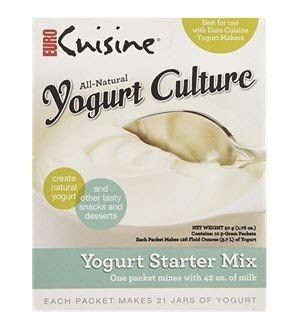There really is nothing quite like the fulfillment that comes with making homemade yogurt. Whether you live alone, have recently been married, or simply want to feed your family with nutritious food, making your own yogurt ensures that you know every single ingredient that goes into it.
Product | Features | Our Rating |
|---|---|---|
Our Overall Favorite | ||
Best Budget Starter | ||
Best Vegan Yogurt Starter | ||
Best Greek Starter Kit |
This means that you and your family can have peace of mind knowing that only good-for-you ingredients have been used, and none of the preservatives, gelling agents, stabilizers, artificial colors, fillers, and sweeteners that are typically found in conventional yogurt.
Several commercial yogurt brands are also sweetened with genetically-modified sugars. High fructose corn syrup and corn syrup are genetically modified. But even the most savvy health enthusiasts probably don’t realize that if the label says “sugar” and not corn syrup, there’s still a pretty good chance that it comes from a genetically modified source.
Homemade yogurt is also much healthier: did you know that fresh yogurt contains more viable bacteria compared to store-bought yogurt? A lot of people underestimate the importance of the quantity of bacteria in yogurt. The truth is that there’s a huge difference, and if you’re eating yogurt you’re probably in it for the health benefits, just like everyone else. But your gut knows the difference between yogurt that’s been sitting on the supermarket shelves for a few days, and fresh, homemade yogurt.
Speaking of gut, let’s clear up one very important thing: not all yogurt is probiotic. Probiotic essentially means that a product contains adequate amounts of microorganisms that provide a health benefit for the host – in this case, you. Yogurt is made by culturing milk using bacteria containing Lactobacillus bulgaricus, or Streptococcus thermophilus. In some cases, manufacturers or people can add more strains of bacteria to maximize its health benefits.
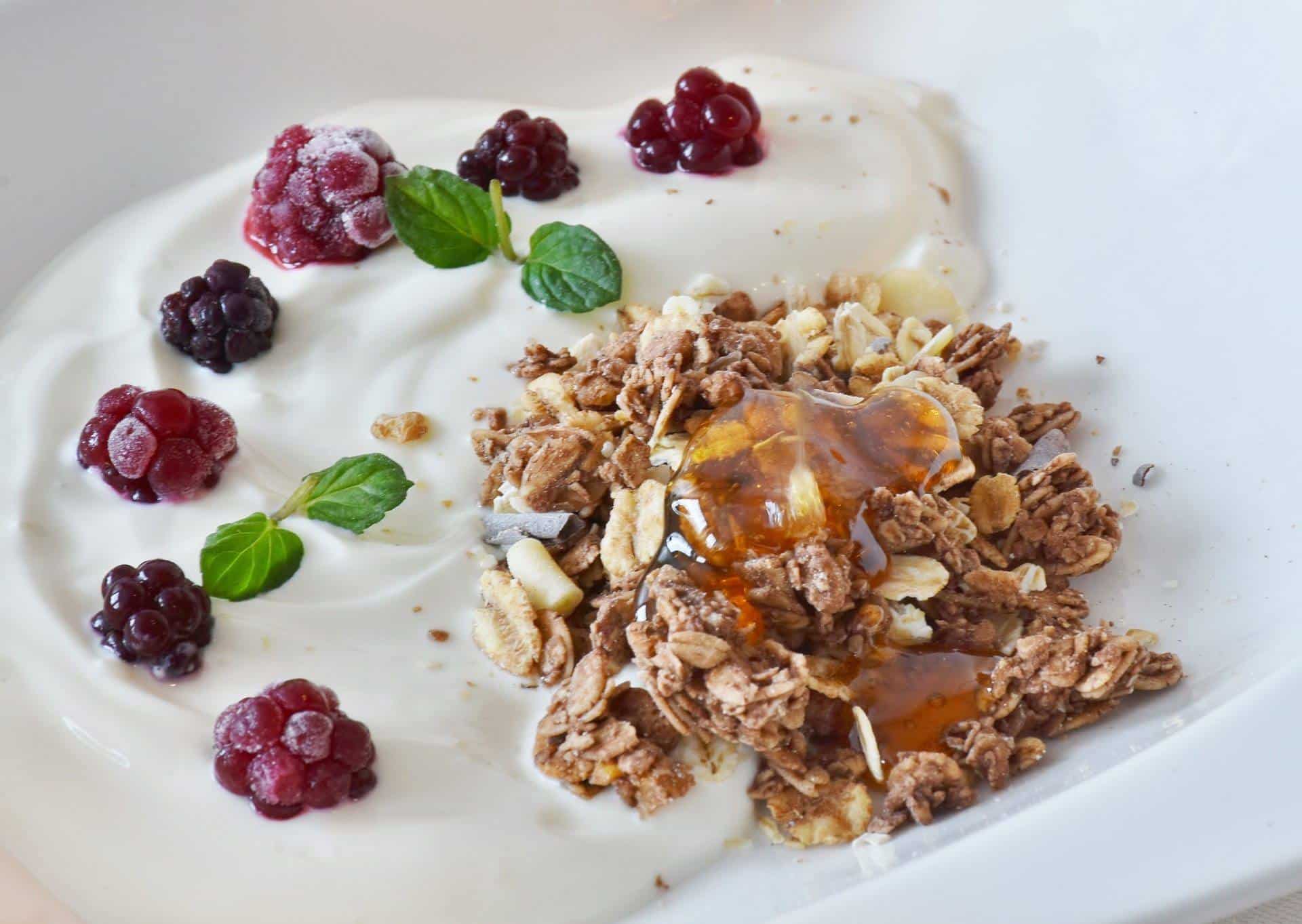
Unfortunately, some yogurt brands heat-treat the product after fermentation, which only kills the live cultures that are in it. In other words, this type of yogurt can no longer be considered probiotic. Probiotic yogurts are only those which are made with starter cultures specifically Lactobacillus bulgaricus or Streptococcus thermophilus (or another sub-strain or species of these), which hasn’t gone under heat treatment after fermentation. And you know what? You can make probiotic yogurt with even the most basic ingredients from the comfort of your own home.
It’ll also save you money in the long run: your weekly yogurt consumption can easily rack up a bill north of $500 a year, especially if you have to feed your family. That’s an unnecessary expense that can be stopped as soon as you invest in a yogurt maker and a few inexpensive, simple ingredients.
But the key ingredient will always be the probiotic yogurt starter cultures.
Table of Contents
- Our Yogurt Starter Culture Reviews
- The Top 4 Best Yogurt Starter Cultures for 2025 are:
- Best Overall: Euro Cuisine All Natural Yogurt Starter Culture
- Best Budget Starter: Yogourmet Freeze Dried Yogurt Starter Pack
- Best Vegan Yogurt Starter: Cultures For Health Vegan Yogurt Starter
- Best Greek Yogurt Starter: Greek Traditional Yogurt Kit
- Altrnative Greek Yogurt Starter: Cultures For Health Greek Yogurt Starter
- Features
- What Exactly Is A Probiotic Yogurt Starter?
- What To Look For When Choosing Your Yogurt Starter
- Frequently Asked Questions
- Yogurt Starters: An Essential Ingredient For Healthy Homemade Yogurt
Our Yogurt Starter Culture Reviews
Navigating the world of yogurt starters can be overwhelming, to say the least. As you’ve read above, there are a handful of things that you need to take into consideration.
The Top 4 Best Yogurt Starter Cultures for 2025 are:
- Euro Cuisine All Natural Yogurt Starter Culture
- Yogourmet Freeze Dried Yogurt Starter Pack
- Cultures For Health Vegan Yogurt Starter
- Greek Traditional Yogurt Kit
Find out which is best for you in our full in-depth reviews below ...

Worry no more: we’ve saved you time by poring through the many yogurt starter cultures in the market, and we’ve come up with five of the best. Have a look.
Best Overall: Euro Cuisine All Natural Yogurt Starter Culture
Deliciously smooth and creamy probiotic yogurt can be whipped up easily with the Euro Cuisine All Natural Yogurt Starter Culture. The box contains 10 packets containing 5 grams of cultures; each packet yields 21 jars of homemade yogurt. They contain balanced amounts of lactic bacteria (L. Bulcaricus, S. Thermaphilus, and L. Acidophilus) for that classic tangy yogurt taste. All you need is to add your favorite flavors and some milk!
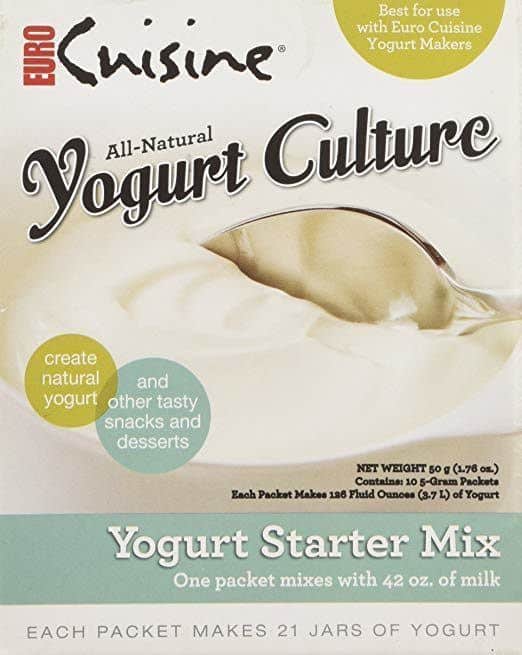
Based on customer reviews, it’s easy to see why the Euro Cuisine All Natural Yogurt Starter Culture is a popular favorite. Several customers have noted that while it takes some planning and preparation to make the yogurt, this starter culture yields a taste and aroma that is all worth it because you simply won’t find anything like it at the supermarket. They also appreciate how the instructions are easy to follow.
Some customers were disappointed in the taste produced by the Euro Cuisine All Natural Yogurt Starter Culture. They found that it was tart, but it really is just a matter of personal preferences when it comes to taste.
Overall, customers rave about the Euro Cuisine All Natural Yogurt Starter Culture. It may not be the cheapest starter culture in the market, but it’s the cream of the crop for customers who value the best in quality and consistency.
Best Budget Starter: Yogourmet Freeze Dried Yogurt Starter Pack
There are many good reasons why you should start making your own yogurt at home rather than opting for the simple, store-bought option: The first reason is that it’s easy to do it! But the best reason is that it’s great for your health. Making yogurt at home gives you far more control over the ingredients: You know exactly what the ingredients are, because you made it yourself.
It’s not just about throwing milk into a yogurt maker and switching it on. The part of the process that actually helps to make the yogurt is the live yogurt cultures that help to turn the milk into yogurt – and for this, you can sometimes use a starter (that is, a little bit of yogurt from a previous batch) or you can opt for a yogurt starter.
Yogurt starters like the Yogourmet starter pack allows for great, natural and healthy yogurt made from scratch, and the Yogourmet brand ensures a winning batch every time.
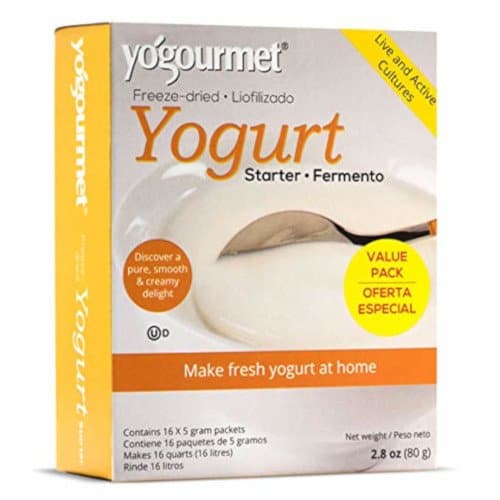
Features
Benefits
There are many different brands on the market, so you might be wondering why Yogourmet makes for one of the best ones there are. The first reason is the fact that it contains only natural ingredients, and the second is that it contains all the live cultures that your body could ever need.
Healthy and home-made will almost always turn out better than store bought, and this is especially true for yogurt. When you’ve made it yourself, you’ll know exactly what’s in it! And more than this, you can get to experiment with your own unique mixture – add what you like in a yogurt, and leave out what you don’t.
Pros
Cons
Best Vegan Yogurt Starter: Cultures For Health Vegan Yogurt Starter
There’s one for vegans, too. The Cultures For Health Vegan Yogurt Starter is made with a special blend of lactic acid bacterial that you can use to make some tasty dairy-free yogurt that’s smooth and mild in flavor. It’s a direct-set culture; each of the four packets in the box allow you to make one batch of authentic, healthy vegan yogurt. All of the ingredients are non-GMO and gluten-free too.
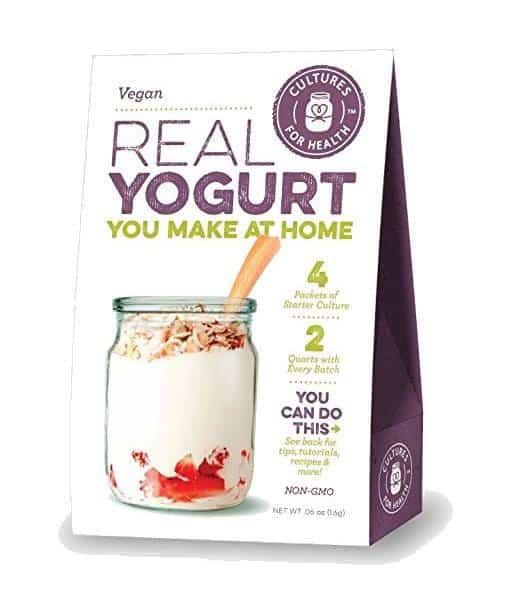
To use the Cultures For Health Vegan Yogurt Starter, just mix one packet into 1 or 2 quarts of a milk alternative. You can also create larger batches by using 2 packets in 1-4 gallons of your preferred milk alternative. Coconut, soy, cashew, or rice milk are popular milk alternatives and they are also good for you. If you want to achieve store-bought consistency, you’ll have to add your own thickener but there are many healthy and inexpensive thickener options around: pectin, gelatin, agar, guar gum, tapioca starch, arrowroot starch, and ultra-gel are recommended. Your tummy will thank you: the Cultures For Health Vegan Yogurt Starter has six types of live active bacteria!
Based on customer reviews, the Cultures For Health Vegan Yogurt Starter is a well-loved choice among vegans and health enthusiasts. People love that it’s easy to use and affordable as well. Not only is it healthy, but this yields yogurt that’s huge on great taste. Customers also don’t mind that you have to use a thickener with this product to achieve the desired consistency, and a huge majority of the customers were very happy with the yogurt this makes.
However, some customers were not too pleased with the fact that Cultures For Health Vegan Yogurt Starter contains maltodextrin. This is not advisable for individuals who may have existing digestive problems.
The Cultures For Health Vegan Yogurt Starter is a top choice for health-conscious individuals or those following a vegan diet. It’s an affordable choice and helps you stay healthy without breaking the bank.
Best Greek Yogurt Starter: Greek Traditional Yogurt Kit
If you love Greek style yogurt, you can’t go wrong with the Greek Traditional Yogurt Kit. It comes with 5 packets of starter culture, high-quality cheesecloth, and calcium chloride. Each packet can be used to culture up to 3 gallons of milk. This kit allows you to make authentic Greek yogurt the traditional way; strain the yogurt curt using the cheesecloth that’s included in the kit to give you that super thick, creamy Greek yogurt we all love.
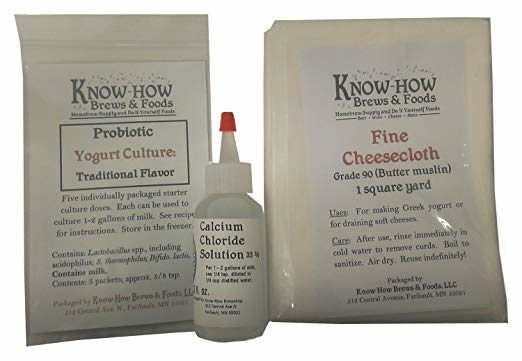
Calcium chloride is a firming agent that is used for food. It’s also commonly used to help firm up cheese or increase the size and firmness of curds that go into milk. Since the Greek Traditional Yogurt Kit already comes with this, there’s very little else you have to buy which makes this so convenient.
Customer reviews for the Greek Traditional Yogurt Kit are glowing. Customers love the taste and texture of the final product, and many even say that it tastes better than store-bought yogurt. They also noted how this starter is more affordable than others, and that’s always a good bonus when you know you’re getting quality for a starter that’s inexpensive.
Overall, customers rave about the Greek Traditional Yogurt Kit. Many have found it to work better than others; the starter culture is consistent and this reduces the chances of you having to deal with a failed batch. For fool-proof homemade Greek yogurt, this is the starter for you.
Altrnative Greek Yogurt Starter: Cultures For Health Greek Yogurt Starter
Cultures for Health is one of the leading health brands out there, and this is their Greek Yogurt Starter that can help you to make some of the best traditional Greek yogurt from scratch. If you were to buy yogurt right off the shelf, it’s likely that it will contain a range of additives, preservatives and other ingredients that you would likely rather avoid – and this is why more people are choosing the healthier option: Making their own!
What’s great about Cultures for Health is the fact that they offer a range of different products, too, if you want to branch out – products that you wouldn’t see anywhere else, including Gluten Free Sourdough.
Back to the Greek Yogurt, the Cultures for Health starter contains essential probiotics for the best yogurt possible (and for better health!). That’s what makes it great.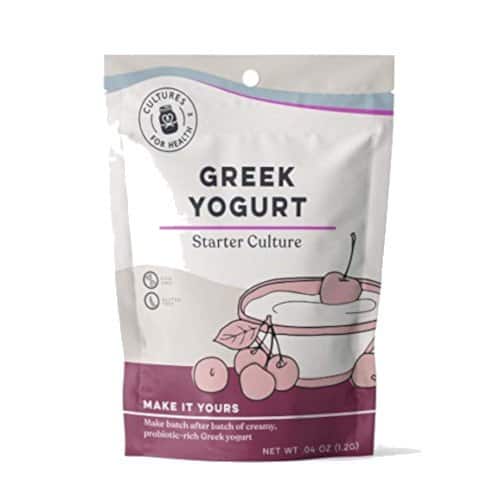
Features
Benefits
Cultures for Health products are all made with your health in mind, and all of their products – including their Greek Yogurt starter – can be excellent for doing and feeling better. The probiotic cultures contained in their yogurt starter can be a great help to boost your immune system so you can feel better while still having the energy you need to want to be healthier. If you’ve never done any of this before and you’re taking on the art of yogurt-making for the first time ever, their website has a range of handy tutorials that can show you the ropes.
Pros
Cons
What Exactly Is A Probiotic Yogurt Starter?
Probiotic yogurt starters are a balanced selection of gut-loving bacteria strains whose primary function is to consume lactose. When you add a starter culture to milk, it will convert the lactose to lactic acid; this is the very process that gives yogurt its unique tart taste.
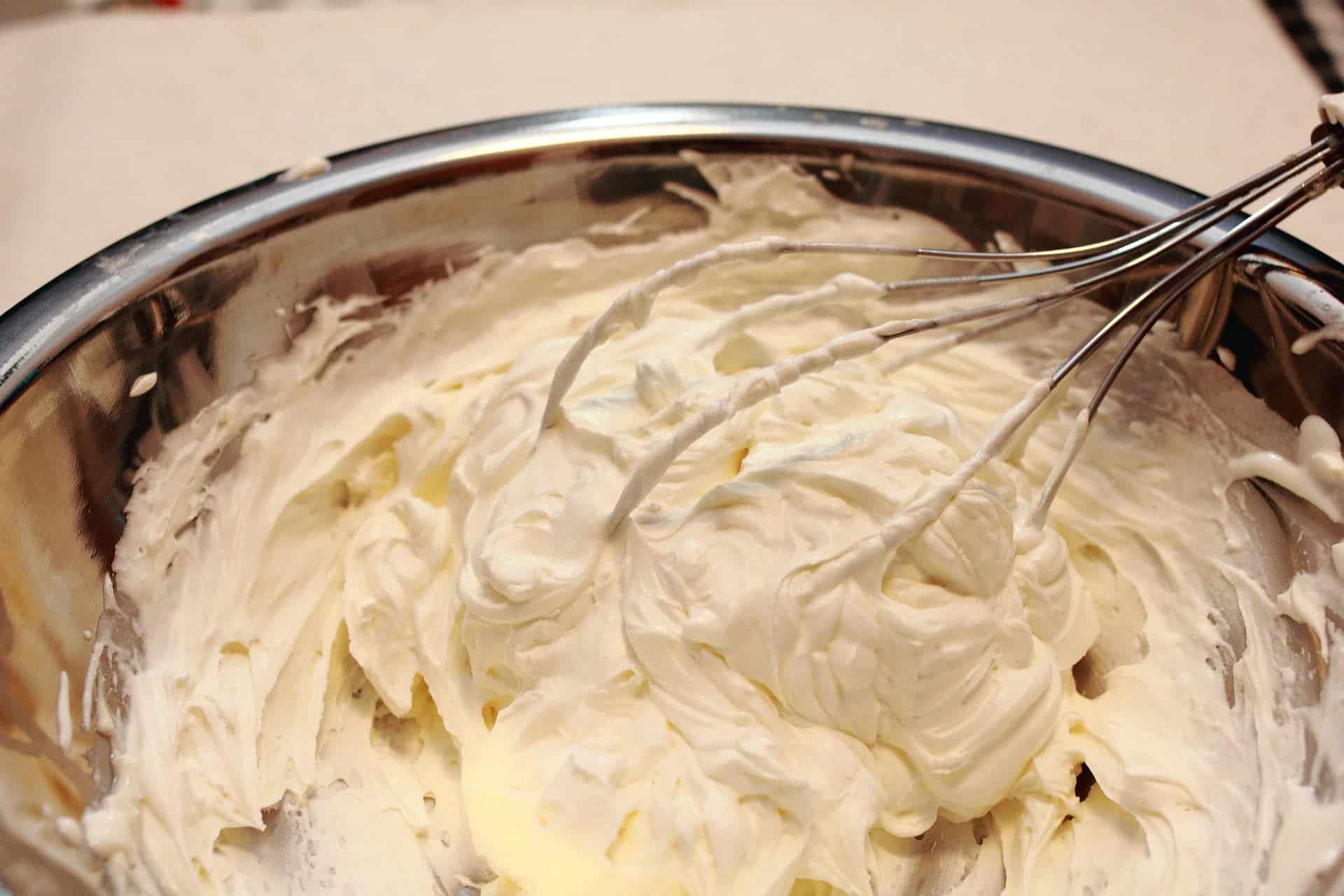
Different bacteria used in starters produce various types of yogurt; sometimes, countries or entire regions are known for producing a certain blend of bacteria. The most common strains of bacteria used for yogurt (as well as cheese) include Streptococcus thermophilus and Lactobacillus bulgaricus. However, many other species of bacteria are derived from these strains and known by other names as well. Different types of yogurt starters will produce yogurt of varying flavors, textures, and thicknesses.
Probiotic yogurt overshadows other forms of yogurt in the health department. Here are just some of its health benefits:
A yogurt starter is one of two ways to make homemade yogurt; with the other option being using previously homemade yogurt, or store-bought yogurt.
What To Look For When Choosing Your Yogurt Starter
There are so many kinds of yogurt starters out there. You can even choose starters that cater to specific dietary preferences such as vegan, or using starters based on the taste and texture it will produce. All probiotic yogurt starters contain millions of probiotic bacteria which culture milk, provided that you follow the instructions for making it.
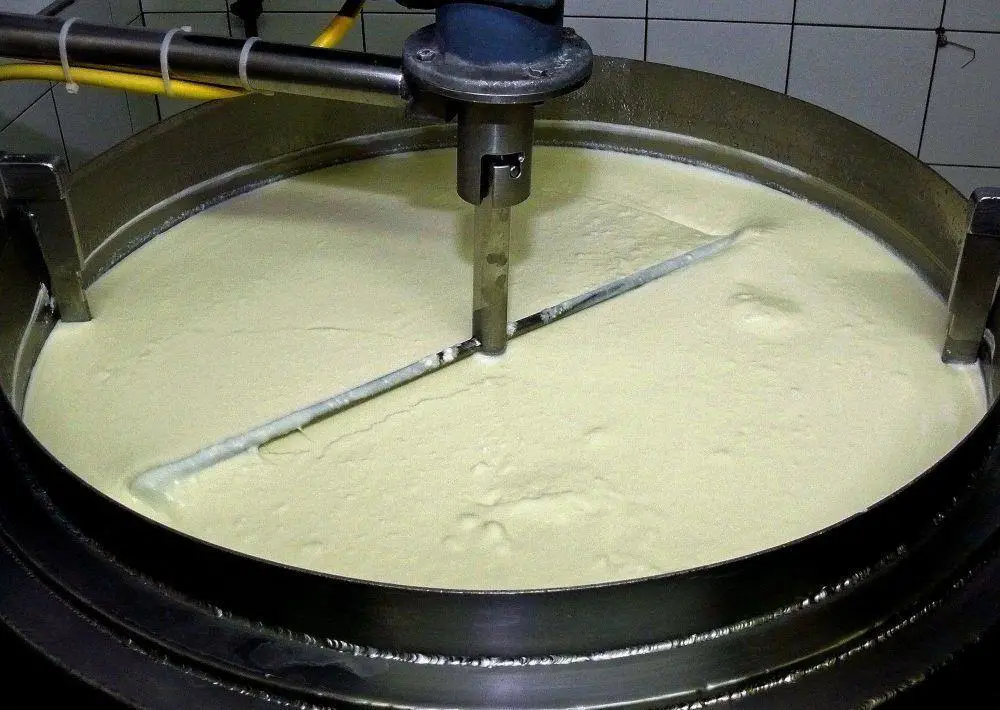
Yogurt starters vary greatly in consistency, thickness, and taste. But at the end of the day, choosing the “right” one will truly depend on your very own preferences.
Here are the basic things you should look for in a traditional yogurt starter:
Taste
Most yogurts are distinct for that delicious, tangy flavor. This flavor is actually a result of milk acidifying during the process of fermentation. Yogurt flavors can run the gamut: from astringent to sour, depending on the kind and varieties of bacteria culture used. Culturing time also has an impact on the taste, since longer fermentation times typically result in a tarter yogurt.
Texture
Yogurt can be gelatinous, creamy, thin enough to sip through a straw, or thick enough to stand upright when placed on a plate. Greek-style yogurts require draining the whey, which gives you that creamy, thicker yogurt consistency. Although Greek yogurts taste similar to other forms of plain yogurt, it contains more protein, fat, and calories. This is just one example of how bacterial cultures used in plain Greek yogurt affect the final texture.
Direct-set vs. Heirloom Bacteria Cultures
These refer to the way bacteria perpetuates. Direct-set cultures, also known as single-use, are added to milk to yield just one batch of yogurt. Seasoned yogurt makers may even re-culture direct-set starter yogurts up to three times more with the use of a new powdered starter. But non-dairy milks can’t be re-cultured. On the other hand, heirloom or reusable cultures have the ability to be propagated indefinitely. When you make each batch of yogurt, simply save some of it which can then be added to another batch of milk for more yogurt. To preserve the bacteria’s potency, reusable bacteria cultures should be propagated a minimum of once every 7 days.
Culturing temperatures
The culturing temperatures of yogurt starters are divided into two: heat loving (thermophilic), or medium loving (mesophilic). Thermophilic cultures are cultured for 5 up to 12 hours after being added into heated milk. These are known to result in yogurt that is much thicker. Mesophilic yogurt starters propagate in room temperatures of around 70-77F. These types of starters don’t require milk to be preheated; just add them to cold milk and allow it to be cultured for 12-188 hours in room temperatures. Mesophilic cultures generally produce thinner yogurt in terms of consistency.
Other things to consider when shopping around for starter cultures include the kind of ingredients you’ll need. Milk is the primary ingredient in yogurt: you can opt to use whole, low-fat, and skim milk. There are also milk alternatives you can use which can cater to specific dietary requirements, and it can help you achieve a certain taste or consistency. Some starter cultures require you to add stabilizers or thickeners. Many customers enjoy using gelatin, different forms of starch, or gums. You can also opt to use your own flavors, fruit preparations, or sweeteners. These are added at various stages in yogurt processing depending on the kind of yogurt you’re making.
Frequently Asked Questions
How much yogurt starter to use?
It is highly suggested to use a small amount of yogurt starter culture to produce a much smoother and creamier yogurt. When using Bacillus Bulgaricus as a starter, use about 2 grams to make half a gallon or 2 liters of yogurt. This is about 1/3 of a teaspoon of starter.
Use about 3 grams of starter to make a gallon or 4 liters of yogurt. This is about half a teaspoon of a starter. The lowest quantity used should be 1/4 teaspoon of starter which is enough for about 16 — 32oz / 0.5 — 1 liter of yogurt. If you use less than one-quarter of a teaspoon, the milk will take a much longer time to ferment or may not ferment at all.
What happens if you use too much yogurt starter?
When you use too much yogurt starter, the bacteria will be too loaded, and will produce an inconsistent yogurt. Basically what happens is the bacteria will run out of "food" before the milk has had time to properly ferment into perfectly consistent yogurt. So please, remember to use the recommended dosage of starter as listed above and check the recommendations on the packaging on your yogurt starter.
Can probiotics be used as yogurt starter?
Yes, probiotics can be used as yogurt starter. Although most probiotic capsules are made of the same substances sold as “starter cultures” such as Lactobacillus Bulgaricus. It’s a good idea to check your label though and learn more about the strains in your probiotic and their benefits before deciding if they’re a good option to use as a yogurt starter.
How long does yogurt culture last?
Unopened packets of freeze dried yogurt culture will basically last forever, but check your packet for the used by date to ensure it’s still good to use.
Heirloom starter culture once activated can be used indefinitely to create new batches of yogurt, but should be reused within 7 days to ensure safely fermented consistent batches. The finished product of yogurt itself should be consumed within 14 days.
Are yogurt cultures good for you?
Yes, yogurt cultures are good for you. Yogurt is as a very nutritious snack. Regularly eating yogurt may increase gut health. Studies have shown that this reduces the risk of heart disease and osteoporosis, including weight management. It provides protein, calcium, and enhances healthy gut bacteria.
Yogurt Starters: An Essential Ingredient For Healthy Homemade Yogurt
No matter what kind of yogurt you’d like to make at home, it always boils down to having the right starter culture and the appropriate yogurt makers. Once you have these two main components, you can make endless batches of perfectly delicious probiotic yogurt.
You may never go back to store-bought yogurt ever again. Considering that most of what’s found in the supermarket basically don’t do anything for your health, consuming conventionally-made yogurt is essentially just like taking added calories and sugars that are completely lacking in nutrients and probiotics. You can also taste a significant difference: as indicated by numerous customer reviews, the homemade yogurt they’ve created tastes superior than those found in the supermarket.

